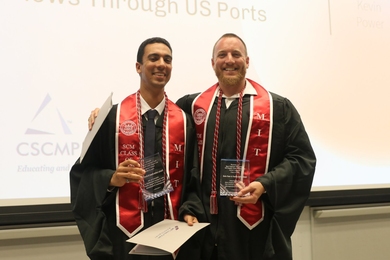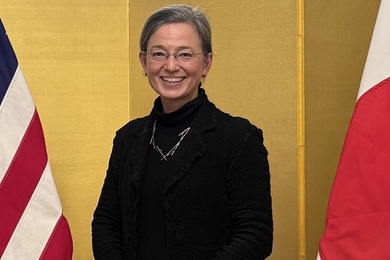MIT experts discussed possible long-term economic consequences of global terrorism last Friday during an audioconference organized by the Center for Transportation Studies.
More than 40 corporations from the United States, Europe and East Asia joined members of the MIT community in the 90-minute session entitled "Global Terrorism and Its Impact on Supply Chain Management." They represent a variety of interests including transportation, manufacturing, consumer goods, aerospace, finance and government. Participants tuned in from 74 locations.
MIT speakers included Professor Yossi Sheffi, co-director of the Center for Transportation Studies (CTS); James B. Rice Jr., director of the Integrated Supply Chain Management Program at CTS; CTS Senior Lecturer Jonathan Byrnes; and Professor Barry Posen of political science.
Though it's too early to fully access the worldwide economic impact of the terrorist attack on New York on Sept. 11, it's clear that it will force logistics and supply chain managers to reassess the assumptions on which they make decisions, participants said.
The increased sophistication of logistical systems in the past 10 years has allowed corporations to increase sales while reducing inventory and logistics costs. Many companies benefited from the "just-in-time" inventory management method where collaboration and teamwork are keys to reducing inventory and exposing manufacturing problems. During the 1990s, the US economy approached a "frictionless" state where information and management techniques such as "just-in-time" combined to allow the free flow of goods and products within the American distribution network.
This manufacturing technique works well when there is a stable source of supply. However, when supply is disrupted, the lack of inventory often results in plant shutdowns. Right after Sept. 11, a number of companies had to shut down operations because of the disruption to inbound materials from other countries.
In the near term, companies lost money from these disruptions. In the long term, they are trying to decide the future of long supply chains that span the world. This will influence the investment patterns of multinational companies.
Most of the speakers and participants felt that global supply chains will continue to exist, but with significant changes. These will include more cooperation among business, government and academia to enhance security while at the same time ensuring that terrorism does not disrupt supply chains.
A number of participants expressed concern over "product flow security." American businesses face the additional prospect of ensuring that the shipments of goods are secure through all of the handoffs within the supply chain.
For more information, contact Ed Schuster, director of the CTS Affiliates Program in Logistics, at ewscts@mit.edu or x3-5239. A recording of the conference will be available online by Nov. 14.
A version of this article appeared in MIT Tech Talk on November 7, 2001.





